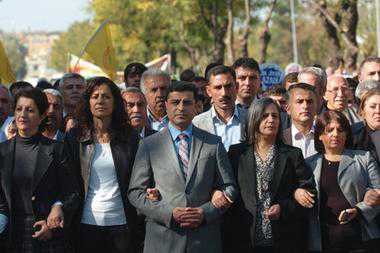By Scott Peterson, Staff writer / November 18, 2010
Mardin, Turkey

For 20 years, Tekin Cifci explored his native Kurdish language in secret, hiding behind a pseudonym when writing for semi-underground Kurdish magazines. For much of that time in Turkey, the use of Kurdish was banned – an utterance on the street could mean time in jail.
But today Mr. Cifci is writing the thesis for his master’s degree, in Kurdish and about Kurdish – and under his real name – as part of Turkey’s first-ever graduate program in Kurdish language and culture.
“I’m still not used to this new period,” says Cifci, who is part of the pilot Kurdish program of Mardin Artuklu University in southeast Turkey’s ethnic Kurdish heartland. The region has been plagued by civil war between Kurdish rebels and the state security forces since 1984, and witnessed tens of thousands of deaths.
That conflict has eased in the past decade. And the Turkish government last year announced a “Kurdish Opening” aimed at improving the lives of ethnic Kurds, by restoring some long-denied cultural rights.
But while many Kurds feel that little has changed – and point to some 1,500 Kurdish politicians and activists rounded up and jailed across the region since the “opening” – the Kurdish language program is planting new seeds that could transform attitudes.
New opportunity
“Each time our teachers explain about Kurdish language and culture, I find myself in a different world,” says Cifci. “It’s like coming into the world again, like being reborn to the culture…. Kurdish was a forbidden language for many years; never mind academic work, even speaking was forbidden…. Now the Kurds are recognized as a nation in Turkey.”
Cifci says he is proud to be one of Turkey’s first crop of “Kurdologists,” one of 30 accepted for the two-year master’s program. The university began its work in Kurdish last summer, teaching a crop of 50 language instructors whose certification will allow them to teach elsewhere in Turkey as new Kurdish programs are founded.
The interest was overwhelming. Some 550 people applied for the three-month summer course, and 350 to be candidates for the master’s degree.
“It’s incredible for me to see the numbers,” says Abdurrahman Adak, assistant chairman for the “live languages” program, which will include the Syriac and Arabic languages, as well as Kurdish. So far only Kurdish faculty have been chosen. “This is making preparation for coming years, if Turkish universities have these [Kurdish] branches. We are preparing from now.”
When setting up the program, the directors visited other well-established Kurdish programs at universities in northern Iraq and in Europe. In coming weeks Mardin will host a number of experts from the Center for Kurdish Studies at the University of Exeter in the United Kingdom.
via In Turkey, Kurdish writers once needed pseudonyms. Now they have a master’s program. – CSMonitor.com.

Leave a Reply